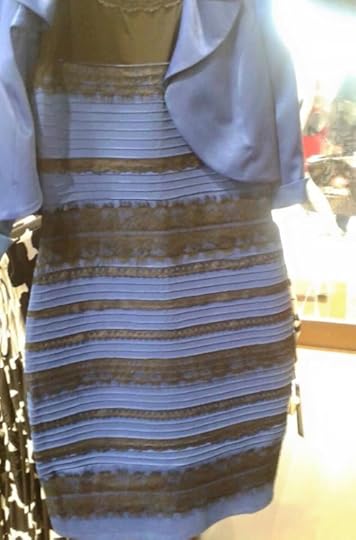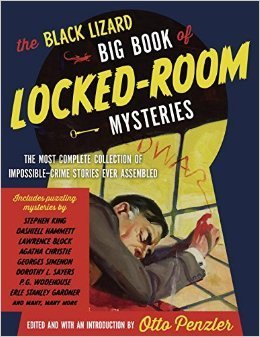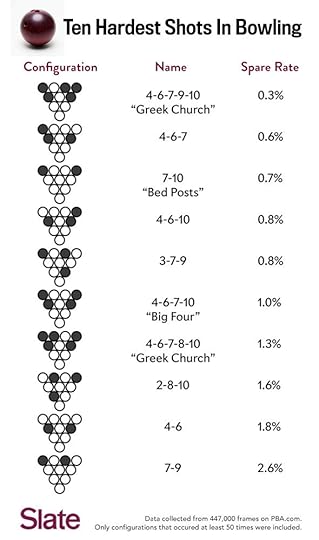E.R. Torre's Blog, page 173
February 27, 2015
Blue and Black or White and Gold…?!
One of the latest great internet debates: Is this dress, presented below, colored blue and black or is it white and gold? What do you see?

Apparently, there is quite a bit of debate and it just goes to show that what people “see” has a certain degree of subjectivity.
If this is intriguing to you, check out this website over at Salon.com that explores the topic of this dress’ color and provides a graphic as to how people perceive it:
As for me? I see a dress that is gold and…very light blue. I suppose that puts me more in the “Gold and White” camp, but to my eyes there is a definite blue tint to the light part of this dress.
February 26, 2015
Basic skills on the verge of extinction
Fascinating (though far too short) article from io9 regarding the above, basic skills which may be on the verge of becoming extinct:
http://io9.com/these-basic-skills-are-on-the-verge-of-extinction-1687835070
I’ve mentioned it before but I’m fascinated by the era we currently live in. Since the advent of the personal computer and the rapid technological advancement of the same, things have changed considerably in our society.
For example, my shopping habits have radically changed (I know this is not really a “skill”, but bear with me). I used to go out at least once a week to either a bookstore, music store, or electronics store to check out the latest novels, magazines, music, or movies available.
The advent of the internet and the ability to transmit information has made going to a store, for better or worse, to look for the above material almost completely obsolete. A few weeks back my wife and I went out to a mall that happens to have the only Barnes and Nobles I’m aware of within thirty to forty miles of our home. While in the story, I found the following book for sale:

I love a good mystery, and locked room mysteries, in particular, can be fun reading. The book was as promised, quite big, and priced at $25. Not all that bad, I thought. But I checked to see if the book was available at Amazon and for the Kindle and, lo and behold, it was and for a much cheaper price.
Needless to say, I didn’t buy the physical book. Why bother? I get the same thing for less money and don’t clutter up my house any more than it already is!
Computers have not only changed my shopping patterns, but I see their influences spreading to other areas, the most fascinating of which, to me, is the potential for self-driving vehicles. I know there’s still much to be done regarding seeing them actually appear, but I would put money on the fact that in the near future, perhaps with the current newborn generation, they will reach driving age and may not have to worry about ever learning to do so.
How weird would that be?
New Alien movie to ignore last two…?
A short while back, director Neill Blomkamp (District 9, Elysium) made considerable waves among the movie fandom community when he presented images of an older Ripley and a disfigured Hicks, late from the movie Aliens, and noted he had worked on an idea for a sequel to that film that would complete the Alien/Aliens saga.
The images (you can see them here) clearly got peoples’ attention at Fox Studios as this film has been green-lighted and will be Mr. Blomkamp’s follow up to Chappie.
One thing that people wondered, of course, was where this film might fit in the Alien cinematic universe timeline. Alien 3, after all, essentially took place “immediately” after the events of Aliens and clearly showed both Hicks and Newt were dead. The images Mr. Blomkamp presented, though, had an elderly and disfigured Hicks standing alongside a more mature Ripley.
What gives?
Well, it now appears this new Alien film might well ignore the events presented in both Alien 3 and Alien Resurrection:
http://www.slashfilm.com/blomkamps-alien/
Since learning of this there have been some commentaries pro and con regarding the need -if there even is one- to follow “continuity” or ignore it. Given the fact that few hold either Alien 3 or Alien Resurrection in as high regard as the first two films, I suspect it will be easier for audiences to accept the idea of ignoring these later two Alien films.
Continuity, I find, is a curious thing. If you’re into comic books, continuity can be a blessing as well as a curse. The Superman who appeared in Action Comics #1 way back in 1938 is not the same Superman as is presented today. Sure, he still sports the Clark Kent “disguise” and has the hots for Lois Lane (both ideas present in that first Superman story) and he is from Krypton, but there are noticeable difference. That Superman, for instance, couldn’t fly. He jumped very far. He was also a no-nonsense bad-ass who wasn’t adverse to “eye for an eye” type justice. In that very first story, if memory serves, he beats a woman beater!
In movies, too, there have been series that featured continuity “glitches”. In the James Bond film You Only Live Twice (1967) Sean Connery’s Bond comes face to face with Blofeld (played by Donald Pleasance), his S.P.E.C.T.R.E. nemesis. Yet in the film that follow this one, On Her Majesty’s Secret Service, not only is Connery replaced with actor George Lazenby, but Bond once again comes face to face with Blofeld (this time played by Telly Savalas) yet the two do not appear to recognize each other!
Then there’s the fact that the original Star Wars, before George Lucas made all the big and little changes to it, clearly had Luke Skywalker fall instantly head over heels for Princess Leia who, in the very next film, is revealed to be his twin sister!
The bottom line for me is that I don’t have much of a problem ignoring either Alien 3 or Resurrection. While I felt neither film was “horrible”, considering what came immediately before, these last two films in the series were much weaker. I’m curious to see what Mr. Blomkamp is up to, though having seen his first two films he’s only batting 500. I enjoyed District 9 but didn’t like Elysium much at all.
Hopefully, his Alien film will be more in line with District 9.
February 24, 2015
This War of Mine…
Fascinating review of a decidedly different take on the war video game called This War of Mine. Instead of focusing on a character who goes around building up his weaponry and killing literally hundreds upon hundreds of bad guys, This War of Mine focuses on common civilians trying to survive during a time of war.
From the sounds of it, this is a deeply affecting game that shows both the costs and price of survival in a war zone. I’m curious to try it out, even though the review paints it out to be a deeply depressing experience, which of course makes sense:
Because you had to know! (Part Deux)
I like to think I run a respectable blog, but let’s face it, you don’t daintily nibble on scones and/or caviar while drinking herbal tea each day. Sometimes, you go for raw, greasy, meat.
So here you go: 35 Funny Strip Club names:
February 23, 2015
Renewable energy finally making sense…?
This is the type of article that gives me optimism that maybe our society is finally moving into more forward thinking/futuristic concepts:
I’ve long felt we’ve been using old technologies for waaaay too long. The gas powered automobile, for example, has stuck with us for over a century now. To me, this is like going into a computer store and picking up 1994’s latest computer model.
What always holds people back is familiarity. We’re comfortable with cars because we understand them, and the idea of a car that uses only electricity to run, or runs by itself, is a cognitive leap our brains may find hard to take.
So too with renewable energy. For decades we’ve known that energy could be made from something that occur naturally each and every day: Wind, tides/currents, sunshine.
What kept us from investing strongly into this potential tech was, I felt, two-fold: We are comfortable with the current polluting technology (which, by the way, is reasonably cheap compared to the big investments needed to pursue renewable energy) and this idea that what we have now works, so why mess with it?
The answer to the later question goes right back to what I said about buying an old computer, and it would appear that large U.S. companies are now becoming more comfortable with the idea of using renewable energy. The early work is done and the price to get the process working for you is coming down.
As I said, articles like this fill me with optimism about the future. Perhaps we’ve started to turn that corner and can finally create a more “clean” world.
Last night’s Oscars….
I didn’t catch it in its entirety and it occurs to me that I’ve never watched the entire telecast from start to finish, even in the years that I was most curious/had the time to do so.
One of the nice things about the internet is that the next day you can pretty much catch everything of importance that occurred in the form of clips and the plentiful articles.
I know I’m not stating anything revolutionary here, but it sure saves time!
February 20, 2015
Autonomous automobiles…
One of my latest fascinations is the self-driving, or autonomous, car. I’ve read up on Google’s research into such a device and noted how Tesla cars will soon have automatic driving features as well. Uber, for their part, is working very hard on creating an automated vehicle, and Zack Kanter offers the following incredibly fascinating essay on what he feels might happen when -and he believes this will occur quite soon- autonomous vehicles become the norm:
Central to his essay is the following paragraph:
Autonomous cars will be commonplace by 2025 and have a near monopoly by 2030, and the sweeping change they bring will eclipse every other innovation our society has experienced. They will cause unprecedented job loss and a fundamental restructuring of our economy, solve large portions of our environmental problems, prevent tens of thousands of deaths per year, save millions of hours with increased productivity, and create entire new industries that we cannot even imagine from our current vantage point.
I couldn’t agree more with his assessment, both in terms of the good and the bad of a society filled with autonomously driven vehicles.
Think about it for a second: We have to spend several thousand dollars each year on our cars, from buying/leasing them to buying gasoline (electric cars, while far more fuel efficient, nonetheless will cost to recharge) to paying for insurance.
Now imagine this: A fleet of autonomous cars on the road that you can “call up”, not unlike a taxi, using your smart phone. These vehicles, completely computerized, will give you a time of arrival to pick you up, an estimated time of arrival at your destination (you will be able to set your destination before they show up), will come to pick you up, take you to your destination, then immediately head out to pick up their next ride.
This fleet of cars will be owned by some company. Perhaps it will be Google or Uber or whichever company(ies) service them. When they get low on fuel or their sensors detect they need service, they return to wherever they are warehoused, are refueled and serviced, and sent on their way again, continuing their work until they again need to be charged or serviced.
Assuming there is a very large fleet of such automobiles, actually owning your own car becomes unnecessary to your daily life.
Think about it: You go to work/school and drive back home during the weekdays. On many of those days once you get home you don’t need to go out again. How convenient is it to simply call in a car to pick you up in the morning, let it drive you to school or work while you sit back and either read the paper or do your work, and then, when your work/schoolday is done, you call another vehicle to come pick you up and, viola, you repeat the process in reverse?
If you need to go shopping at your local grocer/mall, you can do the same, get picked up and taken to your local grocery store or mall, you buy/do what you need, and as you’re heading out the door, you call a car and it takes you back home with your shopping.
But what if you want to travel very far? Say you live in New York and want to drive down the coast and go to DisneyWorld? There could be larger automated vehicles designed for this longer trip. Or, conversely, you could simply rent a car for that period of time. Car Rental agencies might have to become services designed for longer transport rather than people who stay within a city.
Regardless, renting a car or using an automated service would be far cheaper than having and maintaining your own car.
The downside of all this, as pointed out above, is the fact that there are many jobs out there involving people who drive others to their destination and these jobs will be crushed. The taxi industry, in a matter of a few years, would completely collapse with the advent of the automated automobile.
So too would gas stations and automobile service centers. If fewer and fewer people have their own cars and rely on automated travel, then what would be the need to have a gas station? How about a car repair center? Suddenly, they too would become irrelevant. The biggest service centers would be located on the grounds of whatever company has the automated vehicles.
And consider this as well: All those parking garages would also become irrelevant. Sure, there would still be people out there who would cling to their personal automobile.
Sure, there will probably be many who don’t “trust” the idea of a computer driving you from point A to B. However, I can easily see that becoming a very small minority.
And as far as safety is concerned, one would expect that a fleet of automated cars would be safer on the road than those driven by humans. Less car crashes, less death and injury. No more drunk driving (again, you call an automated car to take you to a club, you can get totally blitzed, then when you leave you call a car to take you back home).
Another profession that would have to change: Police. Can you imagine how a police force would change with the advent of automated vehicles? No longer would we have speeders or bad drivers. No longer would we have tickets.
I could go on and on and on.
Sure, computers are not infallible and, naturally, rigorous tests would have to constantly be made with the autonomous vehicles’ computer systems. But that wouldn’t be on us, would it?
Since its creation, cars have been a central part of our society and a near must have to anyone and everyone who needs to go from one point to another. Is it now possible we’re on the verge of no longer needing to have a car of our own?
I suspect the answer is yes.
February 19, 2015
Because you had to know!!!
What is the hardest shot in bowling? If you thought it was the 7-10 split, you’d be wrong…
Turns out the hardest shot in bowling is the “Greek Church”, which involves pins standing in the 4-6-7-9-10 position. The odds of getting a spare from such a formation? 0.3%. The odds of getting a spare from a 7-10 split? 0.7%
If you check out the link you’ll also find the fascinating “Spare Success Machine”, which will tell you the odds for getting a spare for virtually any situation.
All right, for those too lazy to check the link and those uninterested in working the “Spare Success Machine”, here are the hardest shots in bowling to get a spare from, shamelessly taken from the same link above:

As I said, you had to know!
In praise of…artistic theft?!
Interesting, to say the least, article by Alex McCown regarding the above:
http://www.avclub.com/article/praise-artistic-theft-214962
I’ve grappled long and hard with the line which separates artistic “inspiration” from outright “theft.”
In the above article, poet T. S. Eliot is quoted in what I believe is one of the great descriptions of artistic works, and what distinguishes a good artist from a bad one regarding their “inspiration”:
One of the surest tests [of the superiority or inferiority of a poet] is the way in which a poet borrows. Immature poets imitate; mature poets steal; bad poets deface what they take, and good poets make it into something better, or at least something different. The good poet welds his theft into a whole of feeling which is unique, utterly different than that from which it is torn; the bad poet throws it into something which has no cohesion. A good poet will usually borrow from authors remote in time, or alien in language, or diverse in interest.
Let me repeat the quote’s most pertinent lines: “A good poet welds his theft into a whole of feeling which is unique, utterly different than that from which it is torn.”
The term “poet” as mentioned above can easily be replaced with artist, film maker, script writer, novelist, musician, etc.
When Star Wars came out in 1977, and as I’ve mentioned many times before, I wasn’t all that impressed. I believe this was at least partly due to the fact that many of the tropes within the film were recognizable to me. Even on that first viewing I detected elements from, among others, Flash Gordon, Edgar Rice Burroughs, the cliffhanger serials of the 1940’s, and Jack Kirby comic books. Yes, I was a nerdy kid, one who had immersed himself in these various works. Later on, with the advent of the home video market, I came to realize Star Wars also lifted ideas from films by , in particular The Hidden Fortress.
Having said all that, and while acknowledging (once again!) that Star Wars never did much for me, I will now come to the movie’s defense and say that what Lucas did was take elements of many works and, as Eliot notes, “weld(ed) it into something better, or at least something different.”
The same, to my mind, could not be said for the immensely popular Guardians of the Galaxy, a movie that, unlike Star Wars, I wound up loathing. For Star Wars, the inspirations were from (no pun intended) long ago and general audiences were not as familiar with the sources (A good poet will usually borrow from authors remote in time, or alien in language, or diverse in interest). Add to that the fact that while Mr. Lucas appropriated elements here and there, the story presented within the movie, of an evil Empire with a fearsome planet-sized weapon threatening innocents, was relatively original.
So for me Star Wars, flaws and all in my eyes, was a film that nonetheless did well with its inspirations. Guardians of the Galaxy, however, stepped over the line of inspiration and into, in my opinion, outright creative theft.
The bad poet throws it into something which has no cohesion.
This was exactly my feelings regarding Guardians of the Galaxy. They took the plot of Star Wars, changed only a few elements, and essentially re-created that film but with far less cohesion (again, in my humble opinion and, obviously, I was in a VERY big minority).
So, what can we conclude with all this?
That it is all about opinion.
For me, personally, I recognize the influences of other works on my novels. I will come right out and say that they were inspired by many things. But I will then go on to say that I try very hard to take those elements that inspire me and make something new and interesting with them. Sure, the end result may not be completely original -you’d have to look far and wide to find any work of art that is- but I can at least look myself in the mirror and say that I’m trying to create something that may use familiar (or not so familiar) elements and make something relatively “new” with them.
At least I hope so!



